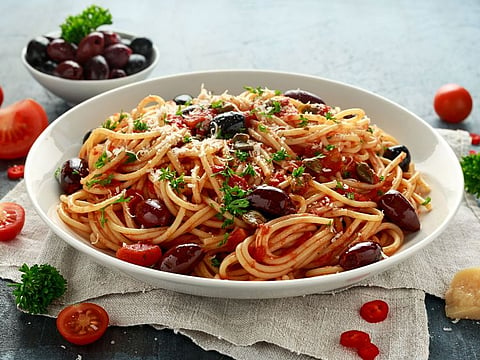No kidding, you can now make pasta, even ice cream from algae, say innovators in Abu Dhabi
Food Tech Challenge in Abu Dhabi names winning ideas worth Dh3.67 million

Abu Dhabi: Can you make pasta or ice cream from algae? Or grow quinoa and strawberries in greenhouses irrigated with saltwater?
It sounds impossible, but innovators around the world think these can be done. Four such innovators were today named as winners of the Food Tech Challenge, which aims to promote food and water security in the UAE.
Has Algae is pioneering the development of everyday foods from algae, while Red Sea Farms is developing saltwater-tolerant crops. QS Monitor, a UAE-based firm, has proposed a system to improve the traceability and inspection of imported food products, while Safety Net Technologies aims to establish sustainable fishing with LED-equipped nets.
The winners were chosen from 437 submissions from 68 countries. They will together receive a Dh3.67million cash prize and have an opportunity to attend a six-week business incubation programme that will help them translate their innovative business ideas into scalable projects.
Food security challenges
Overcoming the challenges of being an arid, water-scarce country, the UAE is already producing food products such as salmon, raspberries and quinoa, said Mariam Al Muhairi, UAE Minister of State for Food and Water Security. Even though only five per cent of its land is arable, the country aims to increase local food production by 15 per cent for some items by 2020, as well as increase yield by 30 per cent.
“The UAE is a global hub for food trade and that is at the core of its food security today. But our wise leadership looks to the future and prepares for it. We know about climate change and we know about the global population [projected to soon] reach 10 billion, which will increase the demand for food by 60 per cent more than what is being produced now. Food waste and food loss are also big issues. Because of these, we are striving to make sure that we do not just continue as a food hub, but also transform food knowledge and technology in the agricultural sector,” Al Muhairi said at a press conference ahead of the award ceremony.
“Many initiatives have been activated to enable this transition and the Food Tech Challenge was just one of these. It aims to kickstart the [drive towards food production] that is innovative, sustainable and has technology at its base,” she added.
Need for tech solutions
The minister added that technological solutions must underpin food production initiatives in the UAE because of its hot, arid climate. These can include methods to increase local production, shorten supply chains and reduce the farm-to-fork distance or even reduce food wastage and crop loss.
“A third of all food produced globally is currently wasted, even as 690 million people around the world go hungry every day. Therefore, there is something wrong with food systems. But the focus on growing food helps foster respect for food and the farmers that grow it, while also making people more conscious about what they themselves consume and about food waste,” Al Muhairi said.
The winning projects
Has Algae has worked on ways to convert microalgae — which is rich in antioxidants and omega 3 — into everyday foods like pasta, yoghurt, ice cream and bread.
Safety Net Technologies’ LED-equipped netting system is expected to help protect an estimated 27 million tonnes of global bycatch, which is fish or other species unintentionally caught while fishing other target species. The system, created by fishermen, is expected to enable sustainable fishing while also preserving fish stocks.
Red Sea Farms has developed salt-tolerant crops. This allows for produce like tomatoes, quinoa and strawberries to be grown in greenhouses using seawater. The solution can cut the use of freshwater in crop production by 90 per cent, transforming agriculture in places like the UAE where access to freshwater is limited.
QS Monitor’s holistic solution for international food inspection and tracing will give consumers confidence that the food they purchase is safe and of a high quality. At present, around 17 per cent of food coming into Dubai from 172 countries each year is rejected by customs for not meeting the necessary standards, contributing to an estimated Dh14.69 billion in food wastage each year. The UAE-based firm’s solution can help reduce this waste. In addition, producers will find it easier to understand the required safety and quality standards needed to produce food and then sell them in UAE markets.
The Food Tech Challenge was organised by the UAE Food and Water Security Office and Tamkeen, an Abu Dhabi-based company mandated to deliver projects that meet the UAE’s vision of knowledge-based development.







